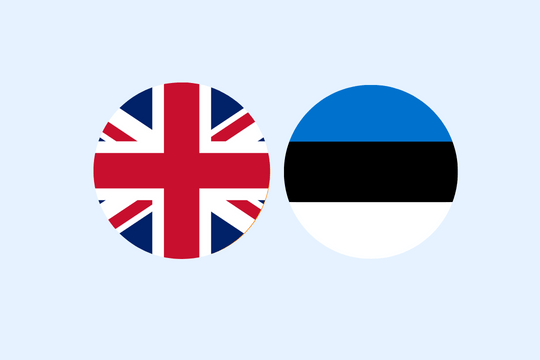how does running a business compare in different countries?
Compare running a company in the UK vs USA (Delaware) vs Ireland vs Portugal vs Singapore vs Estonia: annual costs, business banking access, annual reporting and more.

You may have already identified the best place to start a company, but it’s also important to know how running a business compares in different countries.
Operating a business in a foreign country involves banking, reporting, and paying for annual running costs. And as a business owner, you may have a preference for using digital services like a digital ID to conduct your business affairs from anywhere in the world. But not all countries have advanced digital services, which can make it challenging for people like digital nomads or foreigners living outside the country they operate in, to work efficiently.
In this article we compare what it’s like to run a business in the UK, Delaware (USA), Ireland, Portugal, Singapore and Estonia as a foreigner. The aim is to provide you with a comprehensive overview of your options, by illustrating the differences between these jurisdictions.
Choosing the best country to run a business
Operating a business overseas: How to compare different country options
If you’re looking into where to set up a business, it’s a good idea to start looking at how to compare all your options.
When you’re trying to decide which country is best to run a business from, these are some factors you may want to consider:
- The costs associated with running a company each year
- How easy it is to set up a bank account and operate it remotely
- What the annual reporting requirements are, and how much time, cost and effort they take to fulfil
- Whether digital services like a digital ID are provided to make running a business remotely more simplified and efficient
Operating a business remotely: Comparing the UK, USA (Delaware), Ireland, Portugal, Singapore and Estonia
Below we compare what it’s like to operate a company in the UK, USA (Delaware), Ireland, Portugal, Singapore and Estonia as a foreigner.
We specific look at:
- Whether it’s quick and easy to arrange business banking
- What the corporate reporting requirements are (and how onerous they are)
- The annual running costs of maintaining a business
- The availability of advanced digital services to manage a business online
Running a company in the UK
If you’re starting a company in the UK, then consider these insights around running a business there.
Business banking options
It’s straightforward to open a bank account in the United Kingdom. All you need is proof of ID for the company directors, proof of a registered address for the business, an estimate of your annual turnover, and a registration number which you can get from the UK’s Companies House.
It typically takes between a week and three months to open a bank account in the UK. You’ll need to present yourself in person to open the account. However, if you want to open an online bank account alternative, there are neobanks that can do this electronically.
Corporate reporting requirements
Company tax returns need to be filed each year, or every 12 months. Companies can file their annual tax returns digitally using the Companies House WebFiling service. That includes being able to submit annual reports, changes in company directors or secretary, and filing confirmation statements, etc.
Another alternative for filing returns digitally, is to use the Companies House software which helps send large numbers of tax documents digitally via an XML gateway.
While you can file your taxes yourself without hiring an accountant, it’s important to be aware that there could be significant costs involved in appointing a UK accountant. The cost varies from £25 to £150 an hour, with an average of 114 hours needed to complete the return. You do the maths - that’s quite a large sum to spend each year.
Annual business operating costs
First year costs start from £600 for a low volume freelancer or solopreneur business.
Availability of digital services
The UK offers accessible and easy to use e-services, which help remotely located company owners easily manage their businesses online. However, there is no digital ID in the UK, meaning you might be sacrificing security and data protection for convenience.
Running a company in Delaware, USA
If you’re starting a company in Delaware, then consider these insights around running a business there.
Business banking options
Non-resident company owners in Delaware can open a bank account, but you’ll need to set it up in person.
Corporate reporting requirements
You’re required to submit an annual report for your Delaware-based company on 1 March each year, with corporate tax returns due on 15 April.
Annual business operating costs
The first year costs for running a business in Delaware start from $2,500.
Availability of digital services
Delaware offers various e-services, however they are not very user-friendly. You can file your annual tax report, validate a certificate for your business, and conduct various other business management matters online using the corp.delaware.gov web portal. You also have options to speed up services for additional fees.
Running a company in Ireland
If you’re starting a company in Ireland, then consider these insights around running a business there.
Business banking options
You can open a business bank account in Ireland as a non-resident. This usually entails producing the original company certificate of incorporation and company constitution, as well as the A1 form. Business owners also need to submit a certified photo ID and proof of address. To comply with Ireland’s strict anti-money laundering regulations, you may be required to apply in person at the bank.
An alternative to this for non-residents, is to apply with an Irish Fintech to open a bank account.
Corporate reporting requirements
Ireland’s Companies Registration Office (CORE) offers an online filing system where companies can submit their tax returns online. This helps make it easy for non-resident business owners to comply with reporting requirements.
In addition to filing taxes online, you can also change your business name or address, and manage a range of other business-related matters.
Annual returns are filed each year along with a copy of the company’s financial statements. Corporate tax needs to be filed with the Irish Revenue each year.
Annual business operating costs
The first year costs of operating a business in Ireland start at around €2000.
Availability of digital services
Ireland does provide a range of useful digital services to help you submit tax returns and manage business matters online. However there’s no Irish digital ID and we’ve heard anecdotes that the services are not strictly digital in practice and still require printing and scanning of paper documents and forms.
Running a company in Portugal
If you’re starting a company in Portugal, then consider these insights around running a business there.
Business banking options
Foreigners, whether resident or non-resident, will find banks in Portugal willing to open a business bank account for them. Applicants will first need to get a Portuguese NIF (Tax Identification Number) and present their photo ID, proof of address, proof of employment and NIF to the bank. Non-resident accounts will likely require more documentation and carry more restrictions. Some banks might open an account online, however most traditional banks will require at least one visit to validate your identity in-person. Business bank accounts offered by fintechs like N26 might be a more suitable option in such cases.
Corporate reporting requirements
Companies in Portugal need to file annual tax returns by 31 May each year.
In addition, companies also need to prepare an annual statement of accounts, as well as a director’s report for the company in line with the requirements of the Commercial Companies Code.
Annual business operating costs
The first year costs of operating a business in Portugal start at around €80, which excludes costs of a lawyer, authorised agent, or migration service provider.
Availability of digital services
Portugal says it will offer a range of digital public services to e-residents. These e-services could potentially help facilitate the remote management of companies. However - until their e-residency programme launches - then at present you’re not able to run a business entirely online in Portugal as a foreigner, without the help of an authorised agent or a visa/permit. And many people struggle to navigate their online system leading to confusion - and compounded by bureaucracy.
Currently, the Portuguese e-services allow businesses to view company corporate documents online, obtain an annual report and access a range of different digital government platforms such as Certidão Permanente, Empresa Online, Registo Comercial and Licenciamento Industrial.
In the future, it’s advertised that the e-Residency online portal will enable corporations to file taxes online and conduct other important business management functions digitally.
Running a company in Singapore
If you’re starting a company in Singapore, then consider these insights about running a business there.
Business banking options
Opening a bank account in Singapore requires you to be physically present - you cannot do this all online. To open a bank account in Singapore as a foreigner, there may be different procedures involved, depending on which bank you choose.
You’ll generally need to submit a copy of your company constitution, a resolution and provide proof of address for all your board members. And although you may apply online for the bank account, you’ll need to have your identity verified in person.
Corporate reporting requirements
All companies in Singapore need to file annual returns with the Accounting and Corporate Regulatory Authority (ACRA), as well as financial statements. Listed companies need to file these tax returns within 5 months of their financial year end (FYE); non-listed companies need to file tax returns within 7 months of their FYE.
Annual returns can be submitted online using the BizFile platform, while financial statements can be filed using BizFin.
Annual business operating costs
Annual business costs in Singapore start from €4,000 in Singapore.
Availability of digital services
In Singapore, there are a range of e-services available and a national, digital ID system called the Singpass, which is also used there for businesses to interact with government and private bodies. A Singapore Corporate Access (CorpPass) account is a corporate digital identity used to access e-services online.
If foreigners want to run a company online in Singapore using CorpPass, you’ll need assistance from a local third party to do so, which comes at a cost. And you may need to appoint a local company director or secretary.
Running a company in Estonia
If you’re starting a company in Estonia, then consider these insights around running a business there.
Business banking options
As an e-resident, you can either open a business bank account with a fintech company like Intergiro, Wise or Payhawk - which enables you to open an account online. Or you can open a traditional bank account in Estonia by filling out the pre-approval online and then presenting yourself in-person at the bank to confirm your identity.
Alternatively, you can open an account with another bank within the EU or EEA - convenient for people that may already have a relationship or connection to a bank in another country.
Corporate reporting requirements
You can file all financial and Estonian tax returns online as an Estonian e-resident, using your digital ID. This makes it efficient and easy for company directors to manage their businesses from anywhere in the world.
Companies need to submit an annual report via the Estonian e-Business Register. Income returns and social tax returns need to be submitted each month by the 10th of the month, with VAT returns due on the 20th of each month. Both processes can be completed 100% online.
If you need to hire an accountant for your Estonian company, the e-Residency Marketplace helps provide links to a range of service providers, with fees starting from €50 per hour. It typically takes around 50 hours to prepare and submit taxes each year, which should give you an estimate of costs. There are also various all-inclusive monthly package options available, to help you plan your budget and costs more accurately.
Annual business operating costs
The costs of managing your company for the first year in Estonia start from €200 for a low volume, DIY solopreneur business only utilising a contact person and legal address service. Expect costs to increase as you add on accounting, legal, tax or business consulting services.
Availability of digital services
E-residents of Estonia get a digital ID which makes transacting online easier and more secure. Estonia’s world renowned e-services make it convenient for business owners to transact online from anywhere.
The verdict: the best place to run a business
If you’re looking for the best country to run a business from as a non-resident, then you’ll likely want to compare the banking options, the annual costs to run a business, the annual financial reporting and tax requirements, and how advanced their e-services are.
Compare running a business in these six locations
Business banking options
Corporate reporting requirements
Annual business operating costs
Availability of digital services
Apply for UK bank account in-person, UK fintech accounts can be opened online
Annual accounts filed with Companies House
from £600 (~€700)
E-services available, no digital ID
Apply for US bank account in-person
Annual report filed with the Delaware Corporations Division
from $2,500 (~€2,226)
E-services available, no digital ID
Apply for Irish bank account in-person, Irish fintech accounts can be opened online
Annual returns filed with the Irish Companies Registration Office
from €2,000
E-services available, no digital ID
Pre-apply for Estonian bank account online but in-person visit required to verify identity, fintech accounts located in EEA can be opened online, another EEA bank also an option
Annual report filed with the Estonian e-Business Register
from €200
Streamlined e-services for full remote management, e-resident digital ID offers 24/7 secure and safe use of e-services
Apply for Singapore bank account in-person
Annual returns filed with the Accounting and Corporate Regulatory Authority
from SGD6,000 (~€4,000)
Range of e-services available and a national, digital ID system called the Singpass, but foreigners need a local director or be physically located there.
Apply for Portuguese bank account in-person, fintech accounts can be opened online
Annual reports filed with the Portuguese commercial register
from €80
No online services for foreigners, need an authorised agent to help with filings.
Business banking options
Apply for UK bank account in-person, UK fintech accounts can be opened online
Apply for US bank account in-person
Apply for Irish bank account in-person, Irish fintech accounts can be opened online
Pre-apply for Estonian bank account online but in-person visit required to verify identity, fintech accounts located in EEA can be opened online, another EEA bank also an option
Apply for Singapore bank account in-person
Apply for Portuguese bank account in-person, fintech accounts can be opened online
Corporate reporting requirements
Annual accounts filed with Companies House
Annual report filed with the Delaware Corporations Division
Annual returns filed with the Irish Companies Registration Office
Annual report filed with the Estonian e-Business Register
Annual returns filed with the Accounting and Corporate Regulatory Authority
Annual reports filed with the Portuguese commercial register
Annual business operating costs
from £600 (~€700)
from $2,500 (~€2,226)
from €2,000
from €200
from SGD6,000 (~€4,000)
from €80
Availability of digital services
E-services available, no digital ID
E-services available, no digital ID
E-services available, no digital ID
Streamlined e-services for full remote management, e-resident digital ID offers 24/7 secure and safe use of e-services
Range of e-services available and a national, digital ID system called the Singpass, but foreigners need a local director or be physically located there.
No online services for foreigners, need an authorised agent to help with filings.
Here’s our verdict, based on these metrics:
- Most simple annual reporting requirements: Delaware, Estonia
- Most advanced e-services: Estonia, Singapore (and watch this space for Portugal!)
- Lowest annual operating costs: Estonia, Portugal (although foreigners will need to pay more for an agent)
- Most accessible business banking options: Global AML/CTF Regulations make business banking pretty tough everywhere covered, so let’s say it’s a tie.
More from e-Residency
- Sign up for our newsletter
- Watch fresh video content - subscribe to our Youtube channel
- Meet our team and e-residents - register for our next Live Q&A





